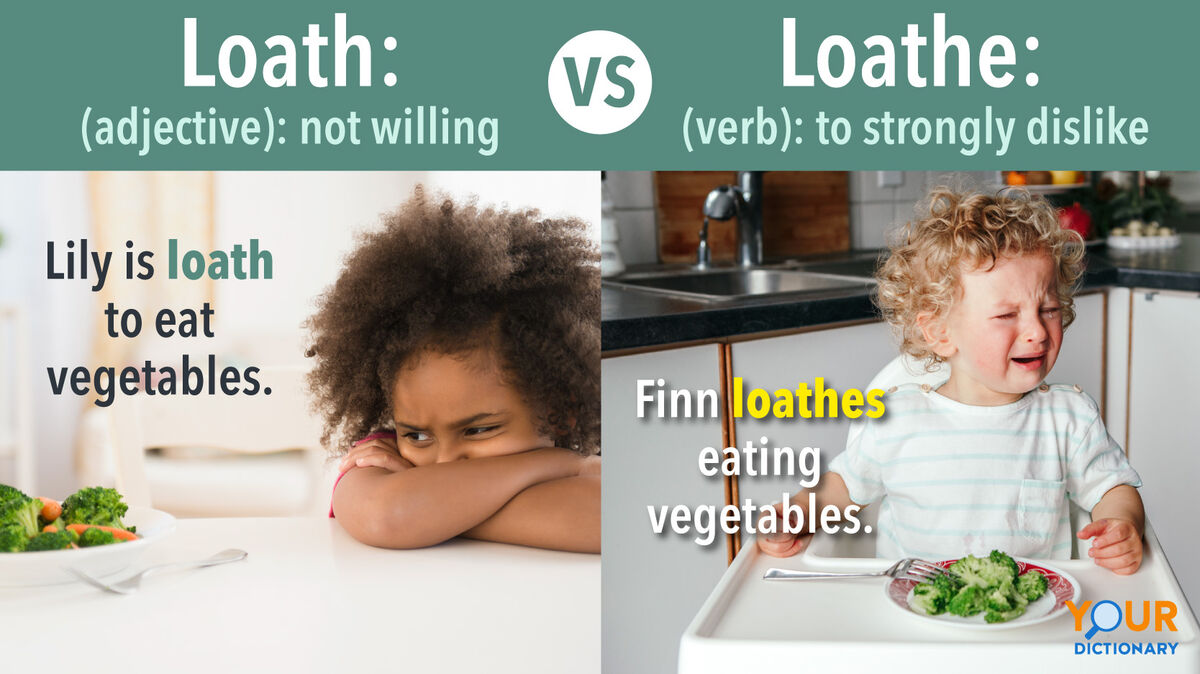
Both loath and loathe describe a hateful or dreadful situation. But that little -e does more work than you think! Decide which one you should use when you really, really don't want to do something.
Is It Loath or Loathe?
It's easy to mix up loath and loathe because of their similar spellings. But their definitions, functions in a sentence and slightly different pronunciations keep them from being the same word.
| Word | Rhymes With | Meaning |
loath (adjective) | both | unwilling to do something |
| loathe (verb) | clothe | to strongly dislike |
Neither word has a positive connotation, and they both describe an undesirable situation. But despite their similarities, mixing up loath and loathe can result in a spelling error that may affect the meaning of your sentence.
Loath Means You're Reluctant
When you are loath to do or try something, you really don't want to do it. A synonym for loath would be "strongly reluctant." Loath only functions as an adjective in a sentence, and it never comes before the noun it describes. You would never say "the loath child won't eat his broccoli." Instead, you would say "the child is loath to eat his broccoli."
Additional examples of loath in a sentence include:
- I'm loath to reschedule the meeting a second time.
- The traffic is really bad, so Sherry was loath to take the freeway.
- My baby is loath to sleep without her pacifier.
- Many teens are loath to talk to their parents about school.
- Kiera hates being scared, so she's loath to see the new horror movie.
Notice the grammatical pattern of loath in these sentences. It follows a noun and a linking verb ("I am loath") and comes before an infinitive verb ("to reschedule").
What About Loathsome?
Loathsome is an adjective that can come before the noun it describes, such as "the loathsome crocodile" or "my loathsome math homework." Remembering this adjective can help you quickly decide whether you should say loath or loathe. After all, loathesome certainly doesn't look correct!
Loathe Means You Hate It
The verb loathe is usually what people are trying to use when they're choosing between loath and loathe. It describes the action of hating or disliking something very strongly. For example:
- I loathe rescheduling meetings for a second time.
- Sherry loathes driving on the freeway when traffic is bad.
- My baby loathes sleeping without her pacifier.
- Many teens loathe talking to their parents about school.
- Kiera loathes seeing horror movies because they scare her.
Loathe is a transitive verb, meaning that it needs a direct object to transfer its action. In other words, the subject must loathe something, whether it's a person, a gerund that ends in -ing or any other noun.
Why Loathing Gets Tricky
Many people mix up loath and loathe because of the word loathing. It has no -e at the end, like loath, but it's the present progressive form of the verb loathe. That's because loathe drops the -e when it changes tense, just like the verbs clothe (to clothing) and bathe (to bathing). Try to think about these similar words when using loathe or loathing in your sentences.
A Fun Tip to Remember the Difference
Now that you know how loath and loathe are different, how do you choose the right one going forward? It's all about the letter "e"!
- Think of something you really don't like that starts with the letter e. Maybe it's eggs, or earaches, or endless drives.
- Put it in a sentence: "I loathe eggs." Or "I loathe earaches."
- Try to think of that sentence when you write the word loathe. If it fits as a verb, you're using it correctly! If it sounds odd, you probably need the word loath instead.
Avoid Loathsome Spelling Errors
While the pronunciation difference between loath and loathe is small enough to hide in spoken conversation, there's no mistaking that erroneous -e when you're writing the wrong word. However, once you know how these commonly confused words function in a sentence, that spelling error is an easy one to avoid. Straighten up more problematic word pairs in your writing with a quick guide to premier vs. premiere.